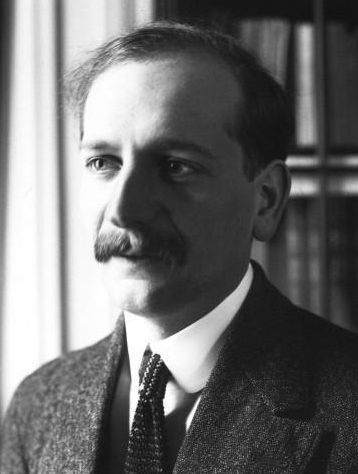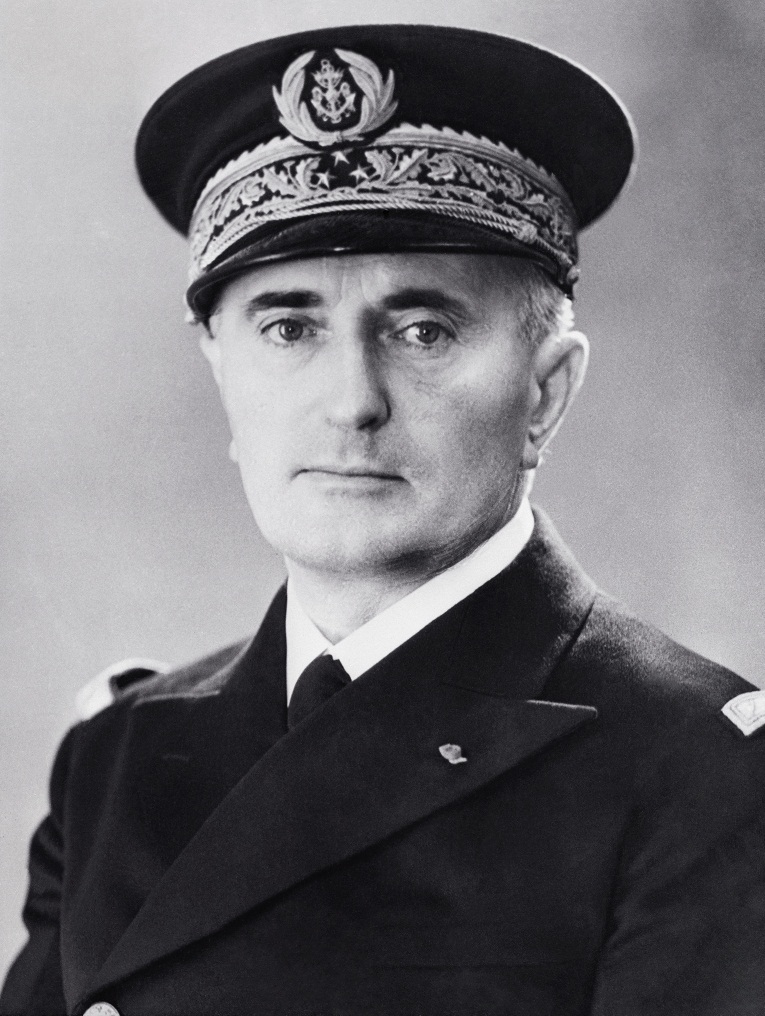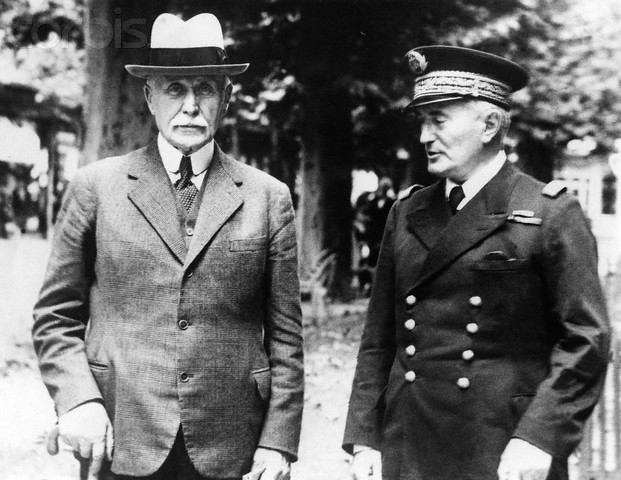<Back to Index>
- Prime Minister of France Pierre - Étienne Flandin, 1889
- Prime Minister of France Jean Louis Xavier François Darlan, 1881
PAGE SPONSOR

Pierre Étienne Flandin (12 April 1889 at Paris, France – 13 June 1958 at Saint - Jean - Cap - Ferrat, France) was a French conservative politician of the Third Republic, leader of the Democratic Republican Alliance (ARD), and Prime Minister of France from 8 November 1934 to 31 May 1935.
He held a number of cabinet posts during the inter - war years. Under the premiership of Frédéric François - Marsal, he was, for just five days in 1924, Minister of Commerce. During the premierships of André Tardieu, he was Minister of Commerce and Industry during 1931 and 1932. Between these posts he served under Pierre Laval as Finance Minister. In the cabinet of Gaston Doumergue in 1934, he was Minister of Public Works; in November of the same year, he became Prime Minister – a position that lasted only until June 1935. However, during his term as Premier a number of important pacts were negotiated – the Franco – Italian Agreement, the Stresa Front and the Franco - Soviet pact.
He was the French Foreign Minister when Adolf Hitler reoccupied the Rhineland in 1936.
In December 1940, Vichy Chief of State Philippe Pétain appointed him Foreign Minister and Vice - Premier on 13 December 1940 in replacement of Pierre Laval. He occupied this position for only two months. He was ousted by François Darlan in January 1941.


Jean Louis Xavier François Darlan (7 August 1881 – 24 December 1942) was a French naval officer. His great - grandfather was killed at the Battle of Trafalgar. Darlan rose through the French Navy, ultimately becoming Admiral of the Fleet, and was a major figure of the Vichy regime in France during World War II, becoming its deputy leader for a time.
Darlan was born in Nérac, Lot - et - Garonne and graduated from the École Navale in 1902. During World War I, he commanded an artillery battery that took part in the Battle of Verdun. He remained in the French Navy after the war, and was promoted to Rear Admiral in 1929 and Vice Admiral in 1932. Darlan was made an Admiral in 1936 and Chief of Staff from 1 January 1937. In 1939 he was promoted to "Amiral de la flotte," a rank created specifically for him, and given command of the entire French Navy.
When Paris was occupied in June 1940, Darlan was one of those who supported the premier, Marshal Henri Philippe Pétain. Darlan was rewarded by retaining his post as minister of the navy, and he quickly ordered the majority of the fleet to French North Africa. He refused several invitations from Royal Navy officers to surrender the French Fleet to British control or move it to 'safe' locations in the Caribbean; consequently Churchill feared the French fleet based in Africa would fall into German hands, so he ordered the Royal Navy to attack it at Mers El Kébir on 3 July, killing around 1,300 Frenchmen who only days before had been allies. Darlan's forces bitterly resisted further British attacks on French colonies in Africa, including Senegal and Madagascar.
In February 1941, Darlan replaced Pierre - Étienne Flandin as Pétain's deputy. He was also named minister for the interior, defense and foreign affairs, making him the de facto head of the Vichy government. On 11 February he was named Petain's eventual successor, in accordance with Act Number Four of the constitution. In January 1942, Darlan took control of a number of other government posts. Because he reported only to Pétain, Darlan enjoyed broad powers, although Pétain's own entourage, including his rival General Weygand, continued to wield considerable influence. In running the French empire Darlan relied heavily upon the personal loyalties of key army and naval officers throughout the colonies to head off Free French - affiliated secessionism.
Though Darlan came from a Republican upbringing and never believed in the National Revolution (for example, he had reservations about Pétain's clericalism), he was as much a collaborator as was Pierre Laval, who twice served as prime minister in the Vichy government, and Darlan promoted a political alliance between Vichy French forces and Nazi Germany through the Paris Protocols. However, despite Darlan's efforts to achieve workable relations with the Reich, the Germans soon became suspicious of his opportunism and malleable loyalties. These suspicions were gradually proven true as Darlan's obstructionism mounted; not only did he refuse to provide French conscript labor, but he also insisted on protecting Jewish war veterans and only with reluctance assisted the enforcement of anti - Semitic laws. In April, Darlan was made to surrender the majority of his responsibilities back to Laval, whom the Nazis considered more trustworthy. Darlan retained the post of Commander of the French Armed Forces.
On 7 November 1942, just before the beginning of Operation Torch, Darlan went to Algiers to visit his son, who was hospitalized after a severe attack of polio. What he did not know at the time of his journey was that secret agreements had been made in Cherchell on 23 October between Algerian resistance leaders and General Mark Clark of the combined allied command.
Just past noon on 8 November 1942, 400 poorly armed French partisans attacked the coastal artillery of Sidi Fredj and the French XIX Army Corps of Algiers. About 15 hours later, the partisans had neutralized both forces. Under the command of José Aboulker, Henri d'Astier de la Vigerie, and Colonel Jousse, the insurgent force occupied most of the strategic points of Algiers under the cover of darkness (the General Government, Prefecture, Staff headquarters, telephone exchange, barracks, police headquarters, etc.) and arrested most of the government's military and civil officials. One of the civilian groups, cadets of Ben - Aknoun College under the command of a cadet named Pauphilet, succeeded in arresting Darlan and General Juin, chief commandant in North Africa. The attack by the French resistance became known as the Putsch of 8 November.
After three days of threats and talks, Clark compelled Darlan and Juin to order French forces to cease hostilities on 10 November 1942, in Oran and 11 November in Morocco. The agreement was that in return Darlan would remain head of a French administration. General Eisenhower acquiesced in Darlan’s self - nomination as High Commissioner of France for North and West Africa on 14 November, a move that enraged Charles de Gaulle as well as the local French resistance. On 27 November, the remaining French naval vessels were scuttled at Toulon.
Thinking he was the prisoner of the Allies, the French government dismissed Darlan from his positions just before unoccupied France was occupied by the German army, in order to meet the threat from the Allies in north Africa. Most French troops in Africa followed Darlan's lead, but certain elements joined the German forces in Tunisia.
On the afternoon of 24 December 1942, a member of the resistance group led by the monarchist Henri d'Astier de la Vigerie, the 20 year old Fernand Bonnier de La Chapelle entered Darlan's headquarters in Algiers and shot the Admiral at point blank range. Darlan died a few hours later and was replaced as high commissioner by another French flag officer, General Henri Giraud. La Chapelle was executed by firing squad on 26 December.
Darlan was unpopular with the Allies – he was considered pompous, having asked Eisenhower to provide 200 Coldstream Guards and Grenadier Guards as an honor company for the commemoration of Napoleon's victory at Austerlitz. It was said that "no tears were shed" by the British over his death, whose murder removed a potential rival to De Gaulle's leadership of the Free French. Harold Macmillan, with brutal political realism, gave Darlan his ultimate political epitaph: "Once bought, he stayed bought."